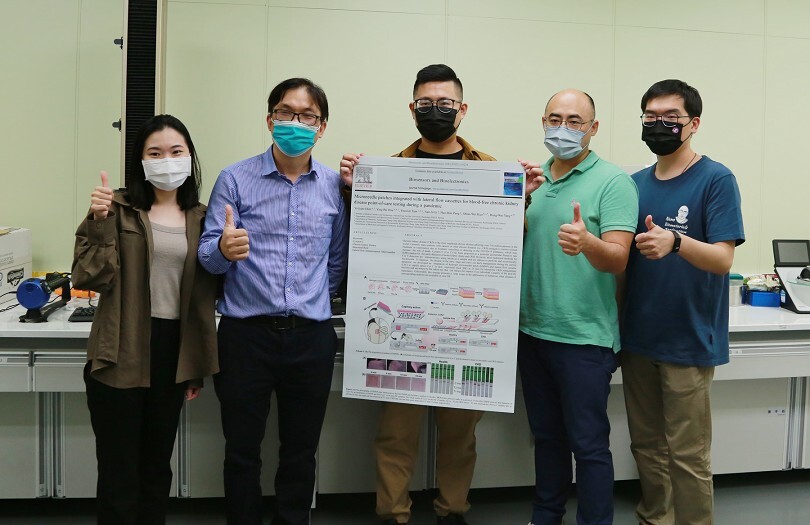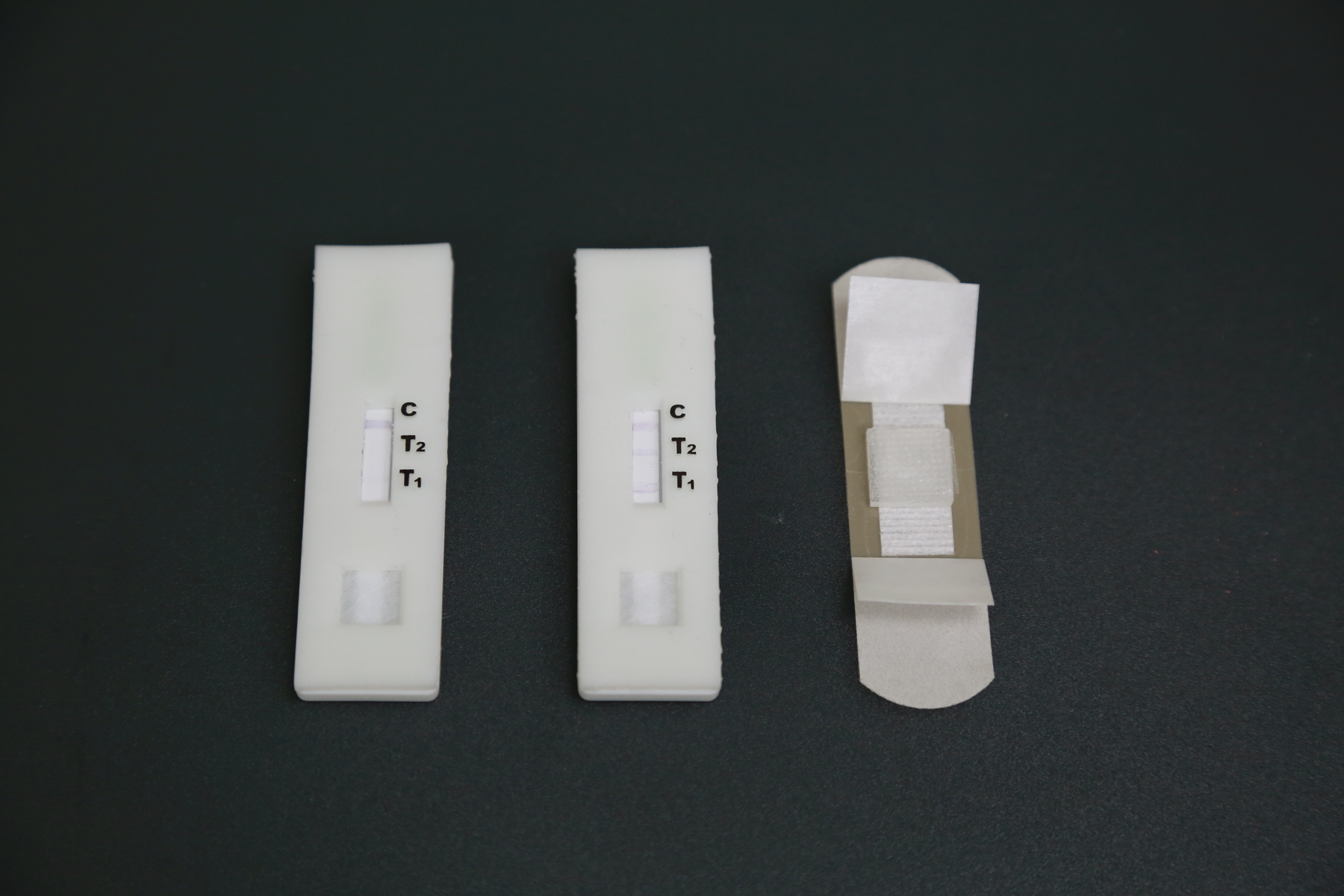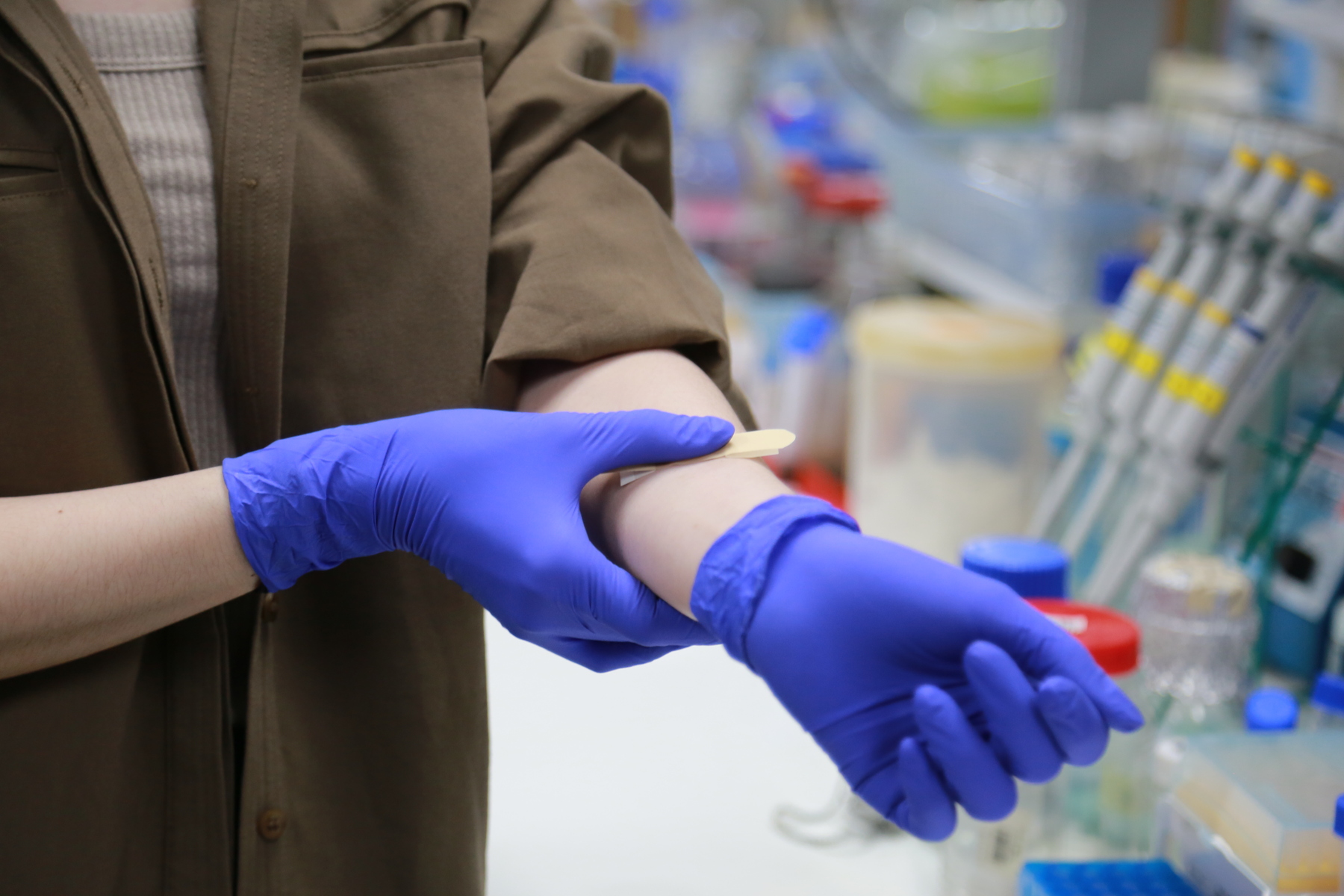NSYSU collaborating with Kaohsiung Chang Gung Memorial Hospital to develop kidney disease rapid test techniques



Patients suffering chronic conditions are the most neglected group during the COVID-19 pandemic. Patients who miss the routine test to avoid crowds might not be able to accept timely medical treatment. Seeing risks of delayed treatments, Prof. Hung-Wei Yang’s team from Institute of Medical Science and Technology, NSYSU, collaborating with Dr. You-Lin Tian’s team from Children’s Nephrology Division, Kaohsiung Chang Gung Memorial Hospital successfully developed blood-free and painless rapid test kits for patients with chronic kidney diseases (CKD). With the test kits, it only takes 15 to 20 minutes for patients to take self-testing to justify if they need further treatment, without being exposed to risks from crowds.
TMA is generated by microorganisms in human’s gastrointestinal tracts, and further converted to TMAO, which increases the risk for cardiovascular diseases. TMAO is also one of the urine toxins raising chronic kidney disease patients’ blood pressure, and Creatinine GFR examination is the common way to watch patients’ conditions. However, according to the recent research results, Cystatin C test is considered more acute and fast for chronic disease examination than Creatinine GFR. When doing Cystatin C test, there is no need to consider variables including age, gender, weight, muscle ratio, and reabsorption. Thus, in the fields of high blood pressure and CKD treatment, Cystatin C test is considered quite significant, said researchers from NSYSU and Kaohsiung Chang Gung Memorial Hospital.
The newly developed Cystatin C test kits integrate microneedle patch and lateral flow cassette. The process is painless and blood-free. The microneedle patch is used to extract interstitial fluid from skin. Patients can easily press the used needle on the cassette, drip the buffer solution, wait for 15 to 20 minutes and see the Cystatin C concentration with naked eyes, said Prof. Hung-Wei Yang, Institute of Medical Science and Technology, NSYSU.
The test kits effectively help reduce physician workloads and avoid delayed treatments and risks from crowds. Prof. Hung-Wei Yang emphasized that the technique’s animal experimentation shows results as good as ELISA analysis in terms of accuracy, sensitivity, and specificity. The results are published in the internationally celebrated journal《Biosensors and Bioelectronics》. Research teams are currently planning for human experimentation, expecting to apply the technique to regular self-testing procedures for CKD treatment.
The members of the NSYSU research team include Shiao-Wei Kuo, the co-corresponding author of the article and the Distinguished Chair Professor of Department of Materials and Optoelectronic Science, Yi-Jyun Chen, the graduate student of Institute of Medical Science and Technology, Ying-Pei Hsu, the doctoral candidate of Department of Materials and Optoelectronic Science, and Nan-Si Li, Hao-Han Pang, the Postdoctoral Research Fellows of Institute of Medical Science and Technology.
Please find the full article as the link below
https://www.sciencedirect.com/science/article/pii/S0956566322002743?via%3Dihub
Chronic kidney disease (CKD) is the most neglected chronic disease affecting over 750 million persons in the world. Currently, many patients with cancers or other chronic diseases (i.e., CKD) struggle to receive clinical treatment or examination due to hospitals cancelling or delaying in the COVID-19 pandemic, which may increase the risk of death. Cystatin C (Cys C) has been proposed as a potential glomerular filtration rate (GFR) marker for the early detection of acute kidney injury and CKD. However, most traditional methods for Cys C detection are immunoassays using serum as a sample and are tedious to perform and economically burdensome. To diagnose the disease in the early stage and carry out daily management during the current pandemic, we developed an integration of hydrogel microneedle patch (HMNP) and lateral flow cassette (LFC) to rapidly detect Cys C in skin interstitial fluid (ISF) in 25 min for blood-free CKD management anytime and anywhere by the naked eye that can reduce the impact of an individual's quality of life and life expectancy. Conceivably, this strategy presents a wide scope in the application of numerous other diseases if corresponding analytes are available in skin ISF.
TMA is generated by microorganisms in human’s gastrointestinal tracts, and further converted to TMAO, which increases the risk for cardiovascular diseases. TMAO is also one of the urine toxins raising chronic kidney disease patients’ blood pressure, and Creatinine GFR examination is the common way to watch patients’ conditions. However, according to the recent research results, Cystatin C test is considered more acute and fast for chronic disease examination than Creatinine GFR. When doing Cystatin C test, there is no need to consider variables including age, gender, weight, muscle ratio, and reabsorption. Thus, in the fields of high blood pressure and CKD treatment, Cystatin C test is considered quite significant, said researchers from NSYSU and Kaohsiung Chang Gung Memorial Hospital.
The newly developed Cystatin C test kits integrate microneedle patch and lateral flow cassette. The process is painless and blood-free. The microneedle patch is used to extract interstitial fluid from skin. Patients can easily press the used needle on the cassette, drip the buffer solution, wait for 15 to 20 minutes and see the Cystatin C concentration with naked eyes, said Prof. Hung-Wei Yang, Institute of Medical Science and Technology, NSYSU.
The test kits effectively help reduce physician workloads and avoid delayed treatments and risks from crowds. Prof. Hung-Wei Yang emphasized that the technique’s animal experimentation shows results as good as ELISA analysis in terms of accuracy, sensitivity, and specificity. The results are published in the internationally celebrated journal《Biosensors and Bioelectronics》. Research teams are currently planning for human experimentation, expecting to apply the technique to regular self-testing procedures for CKD treatment.
The members of the NSYSU research team include Shiao-Wei Kuo, the co-corresponding author of the article and the Distinguished Chair Professor of Department of Materials and Optoelectronic Science, Yi-Jyun Chen, the graduate student of Institute of Medical Science and Technology, Ying-Pei Hsu, the doctoral candidate of Department of Materials and Optoelectronic Science, and Nan-Si Li, Hao-Han Pang, the Postdoctoral Research Fellows of Institute of Medical Science and Technology.
Please find the full article as the link below
https://www.sciencedirect.com/science/article/pii/S0956566322002743?via%3Dihub
Chronic kidney disease (CKD) is the most neglected chronic disease affecting over 750 million persons in the world. Currently, many patients with cancers or other chronic diseases (i.e., CKD) struggle to receive clinical treatment or examination due to hospitals cancelling or delaying in the COVID-19 pandemic, which may increase the risk of death. Cystatin C (Cys C) has been proposed as a potential glomerular filtration rate (GFR) marker for the early detection of acute kidney injury and CKD. However, most traditional methods for Cys C detection are immunoassays using serum as a sample and are tedious to perform and economically burdensome. To diagnose the disease in the early stage and carry out daily management during the current pandemic, we developed an integration of hydrogel microneedle patch (HMNP) and lateral flow cassette (LFC) to rapidly detect Cys C in skin interstitial fluid (ISF) in 25 min for blood-free CKD management anytime and anywhere by the naked eye that can reduce the impact of an individual's quality of life and life expectancy. Conceivably, this strategy presents a wide scope in the application of numerous other diseases if corresponding analytes are available in skin ISF.
瀏覽數:
分享

